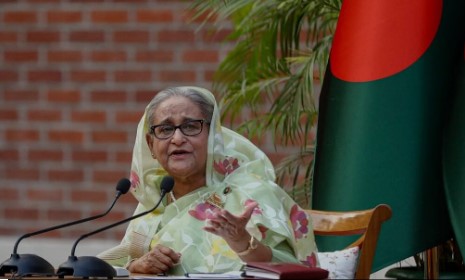In the wake of escalating nationwide violence, Bangladesh Prime Minister Sheikh Hasina reportedly resigned from the top post and departed Dhaka in a military helicopter on Monday.
She is believed to be headed for a location in Bharat, although official confirmation is pending.
ProthomAlo reported that Hasina’s helicopter took off from Bangabhaban, the official residence of the Bangladesh president, at 2:30 pm local time. Accompanying her was her younger sister, Sheikh Rehana. Sources suggest that the Prime Minister is en route to Indian State of West Bengal.
Protests escalated dramatically when demonstrators breached the gates of Gono Bhaban, the PM’s residence, around 3 pm, according to The Daily Star. The unrest was part of the Anti-Discrimination Students’ Movement’s “March to Dhaka” program, which saw thousands gathering at the Mirpur 10 roundabout and moving towards Farmgate.
The country’s Army Chief General Waker-Uz-Zaman was initially set to address the nation on television but was reportedly pushed back, according to the Inter Services Public Relations (ISPR), as cited by The Daily Star.
The crisis intensified on August 3, when the Anti-Discrimination Student Movement demanded the resignation of Hasina and her cabinet. Nahid Islam, a key organiser, announced this demand at a rally at the Central Shaheed Minar. This followed Hasina’s call for dialogue at Gono Bhaban to end the violence surrounding the quota reform protests.
Despite her appeal for peaceful negotiations, the Anti-Discrimination Student Movement announced a rescheduled “March to Dhaka” for Monday, urging nationwide participation to press for the government’s resignation. Coordinators Asif Mahmud, Sarjis Alam, and Abu Baker Majumder confirmed their commitment to the march.
In response to the deepening crisis, Bangladesh announced a three-day shutdown of public and private offices, including banks. The protests have centered around reforming the civil service quota system, which reserves jobs for specific groups, including descendants of 1971 war veterans.
The unrest has resulted in at least 93 deaths and thousands of injuries, many from gunfire, according to The Daily Star. The violence intensified as ruling Awami League members took to the streets to counter the anti-government demonstrations.
The protests were triggered by the Opposition to a new policy allocating government jobs to descendants of freedom fighters, leading to widespread violence, including attacks on state television headquarters and police booths in Dhaka.

















